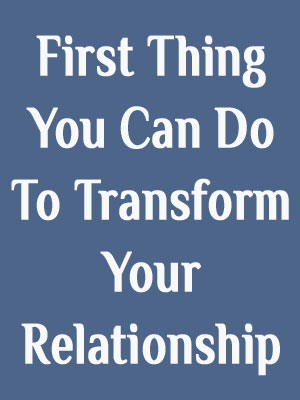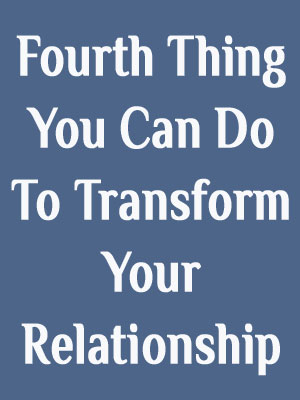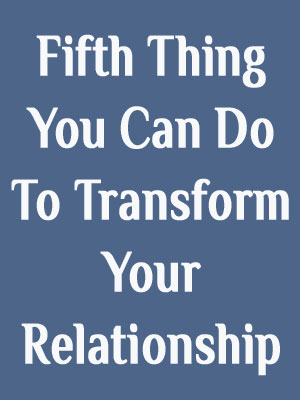

Have you ever read the Einstein quote about how futile is it to try to solve a problem from the same level in which it was created? I believe his quote applies to ineffective communication.
When we use language habits that reside in what I call the right/wrong framework, it can create conflict in our relationships. When we try to solve those conflicts, we use the same right/wrong framework, which doesn’t work and makes things worse.
I realize this is all a bit philosophical, so let’s review a specific example of how we habitually respond out of the right/wrong framework.
Have you ever caught yourself making judgments directed at your partner about an issue? Whatever it was that you wanted that you were not getting, I’m guessing your partner didn’t feel inspired to want to give it to you after hearing your judgments. After your partner didn’t give you what you wanted, you probably made even more right/wrong judgments about your partner.
This is is an example of operating out of the right/wrong framework which blocks the flow of compassion.
Upon becoming aware of your judgments and critical comments, you might start judging yourself over judging your partner. Maybe you judge yourself as being a “judgmental” or “critical” person. You possibly do this to inspire yourself to change and communicate differently with your partner. Also not very inspiring, right?
This too is trying to solve the problem at the same level in which is created.
So how do we get around this?
Well, according to Einstein we need to discover a new level from which to solve this problem. (I bet you never imagined getting relationship advice from Einstein…yikes!)
This compassionate framework operates
I remember when I first started bumbling around trying to speak using this compassionate framework. It was frustrating at first. It takes practice to get the hang of this mindset and it can be pretty messy as you transition to a new framework.
Our judgments of others and ourselves are deeply ingrained. Like fish in water, we swim in a sea of judgments never knowing there is compassionate land out beyond this sea.
As I’m coaching couples to experience this compassionate terrain, I often see them slip back into the old right/wrong level and not even know it, that’s part of the learning curve. Having a competent coach to gently guide you along the way accelerates your learning and prevents you from wasting time practicing in ineffective ways.
Adopting this new compassionate framework will get you off the hamster wheel, keep you from shooting yourself in the foot, and liberate you from the futility of trying to solve a problem from the same level in which it was created.
This new viewpoint is the central focus of the 8-Week Online Compassionate Communication Course.


Many of the ways we respond to each other in relationships can be very disconnecting and we don’t even know it! Even though we have good intentions our unconscious conditioning gets the best of us. We unwittingly block the flow of compassion between our selves and our partners.
So part of the challenge of learning a new Level of communication is becoming aware of ways we are responding out of our conditioning and using that as a launching pad to learn to do something differently. Let’s look at an example.
Suppose you feel upset by something a relative said to you at a gathering. You begin to speak with your partner about this upset and want to be heard, understood and would appreciate some empathy about your upset.
Instead, your well-intentioned partner gets out the toolbox and begins to fix you up by offering solutions, advice or telling you why you shouldn’t feel this way. Not the support you were hoping for, right? Your partner’s response is blocking the flow of compassion, understanding, and empathy you were wanting.
In this case, your partner could learn a new level of communication by becoming aware of his/her conditioned response and use such awareness to learn to do something differently, like empathize. And you would become aware of how to clearly articulate to your partner the ways you want to be listened to. You would share precisely how your partner could listen that would feel supportive to you.
By week 3 of the 8-week course, you will become aware of your own conditioning and begin learning to speak and respond in more compassionate connecting ways with your partner.


Couples tend to focus on what the other person is doing and turn a blind eye to how they are contributing to the very communication problem that is so frustrating for them.
- Maybe you express yourself in a demanding way?
- Perhaps you’re critical of your partner making it hard for your partner to listen or respond?
- Or, it’s possible you don’t express what you want at all but expect him/her to know what you want?
- Maybe you do tell your partner what you want over and over again without it being acted upon.
- Maybe there is intense fear about asking for what you want because you equate that with selfishness or neediness?
- Maybe you don’t speak up because, when you do, it causes conflict and you don’t want to rock the boat.
- Maybe you have years of
pent up frustration and there is an emotional intensity that is getting in the way of calm communication. - Maybe you shut down when hearing your partner being demanding. The more you don’t respond, the more your partner will escalate the demanding tone. Is there a way to respond differently in this situation? Yes!
- Maybe you take many things personally and you hear your partner often saying, “that’s not what I said!” Is there a different way to listen? Yes!
For me, I was blind to how I often analyze my partner with my psychological labels in a conflict under the guise of truth-telling and “helping” her. Needless to say, that infuriated her. I finally saw this blind spot in my communication and worked hard to speak differently.
Therefore, when I work with couples I encourage them to focus on how they are contributing to ineffective communication even though it seems like it is all the other’s fault. This immediately empowers them both to change their contribution which changes the relationship.
Often, couples hear my encouragement to look at their own contribution, and interpret that as I don’t think they have valid concerns about their partner’s behavior. I do think they have valid concerns and want to support them to express those concerns in a way their partner can hear and…it is important to look at one’s own contributions to ineffective communication at the same time.
We all have blind spots. The nature of blind spots is we can’t see them. We really can not change some aspect of ourselves we are not aware of, right? So we really need help to bring them into awareness. Two ways you’ll be supported with this in the compassionate communication course:
1) A competent coach can gently support you in becoming aware of your subtle or not so subtle ways of blocking effective communication.
2) Just practicing compassionate communication in the way that I offer in the 8-Week Online Compassionate Communication Course will naturally disclose yours and your partner’s blind spots. It will become self-evident the disconnecting ways you and your partner are communicating and you can do something different which will make a world of difference in all aspects of your relationship.
Tending to your blind spots can inspire powerful shifts in your relationship.


In all the years I’ve coached couples, I’ve never once have seen a couple resolve their differences and conflicts by determining who is to blame or who is at fault. It’s a cat and mouse game that hardly ever results in either person getting what they want or for their conflicts to be resolved.
Here are some of the ways blaming is expressed:
- Judgmentalism, criticizing and fault-finding
- Negativism and nagging
- Being right at all costs
- Attack and defensiveness cycles
- Having the same argument over and over and over.
- Playing psychologist and analyzing each other
I ask couples, “how are these forms of blaming communication working for you two?”
“Not too well” is the usual response. To which I say, “if you continue blaming each other, do you think given enough time that it will work?” At this point, they usually start to see the irrationality of such endeavor. I say, “would you like to learn a new way to communicate?”
I go on to tease apart the blame dynamic: Underneath the blaming language, there is some important need that he/she wants to be met that is not being met. And it is really painful to not have it met. Blaming your partner is an expression of the pain of not getting this need met.
When I blamed my partner, she had a hard time hearing what I wanted and wasn’t inspired to give to me out of the goodness of her heart. The more I blamed, the less likely what I wanted was not going to happen, which stimulated, even more, anger and blame directed at her.
What I just described is the blame dynamic with just one person. It gets really confusing and volatile when two people are enmeshed in a blaming cycle and push each other’s pain buttons. I don’t wish that on anyone. There’s a whole movie about this dynamic called, “War Of The Roses.”
It is not enough to just say to yourself, “I’ve got to stop blaming” or to blame yourself for blaming. Replacing this with a more effective alternative is integral to communicating differently.
Often, I find when one person in relationship backs off the blaming and moves into vulnerability, this serves as an invitation to their partner to join them.
Admittedly, it can be risky and scary, but nonetheless a powerful way to cut through the intractable blaming loop. Most effective, though, if both partners back off from blaming.
I often get the question, “does compassionate communication work if only one partner does it?” It is more effective is if both take the course, but not required. You can learn when taking the course to empower yourself to be heard no matter how he/she communicates. That’s true empowerment!


Let’s face it, sometimes the stereotypes are true that some men are less emotional than women. And this naturally shows up in the way men and women communicate.
Whether it is learned or hard-wired makes no difference, the important point is, men and women sometimes talk PAST each other with their respective styles:
She listens and speaks in a language of emotional connection and he listens and speaks in a language of problem-solving.
Not only that, but they automatically silently expect (demand?) the other speak or listen that same way they do and judge them as wrong or at fault when not doing so: “He’s so in his head and can’t connect with me emotionally,” or “She is way too emotional, she needs to just get to the point.”
For some reason, we think everyone should approach life the way we do. Imagine that.
I can’t tell you how many problems and conflicts I’ve seen that arise from this mistaken notion that the other has to be that way we are, or do things the way we do them or they are deemed wrong.
It is not only gender differences, people differ in the way we process information, perceive things in the world, the values we hold, levels of emotional intelligence, ways of raising children, and so on.
There is a powerful way to learn to accept differences while at the same time be proactive in getting what you want and finding solutions that work for both of you. This is easier to do when we abandon the right/wrong framework and adopt the compassionate framework.
Seeing your partner through the lens of the compassionate framework will inspire more tolerance, patience, and understanding for such differences. This leads to more calm, ease and peace in your life…and who doesn’t want that
Learn more about the 8-Week Compassionate Communication Course.
